Analysis of Value Added Tax on Nigerian Government Revenue Generation
VerifiedAdded on 2021/10/27
|21
|5493
|80
Report
AI Summary
This report delves into the conceptual and practical aspects of Value Added Tax (VAT) in Nigeria, examining stakeholders' opinions on its impact on government revenue generation. It explores VAT's role as a crucial component of fiscal policies and a key source of government income. The study, conducted through a review of existing literature, investigates the effects of VAT on revenue generation and identifies strategies for enhancement to boost Nigeria's economic growth. The analysis covers the historical context of VAT implementation, the legal framework governing its collection, and the implications of fiscal federalism on VAT administration. The report highlights the importance of efficient VAT utilization for improving citizens' living conditions and suggests expanding the tax base to include the informal sector to curb evasion. The study also addresses the ongoing debate regarding VAT collection jurisdiction between federal and state governments, emphasizing the need for fiscal federalism to ensure equitable revenue distribution and economic development.
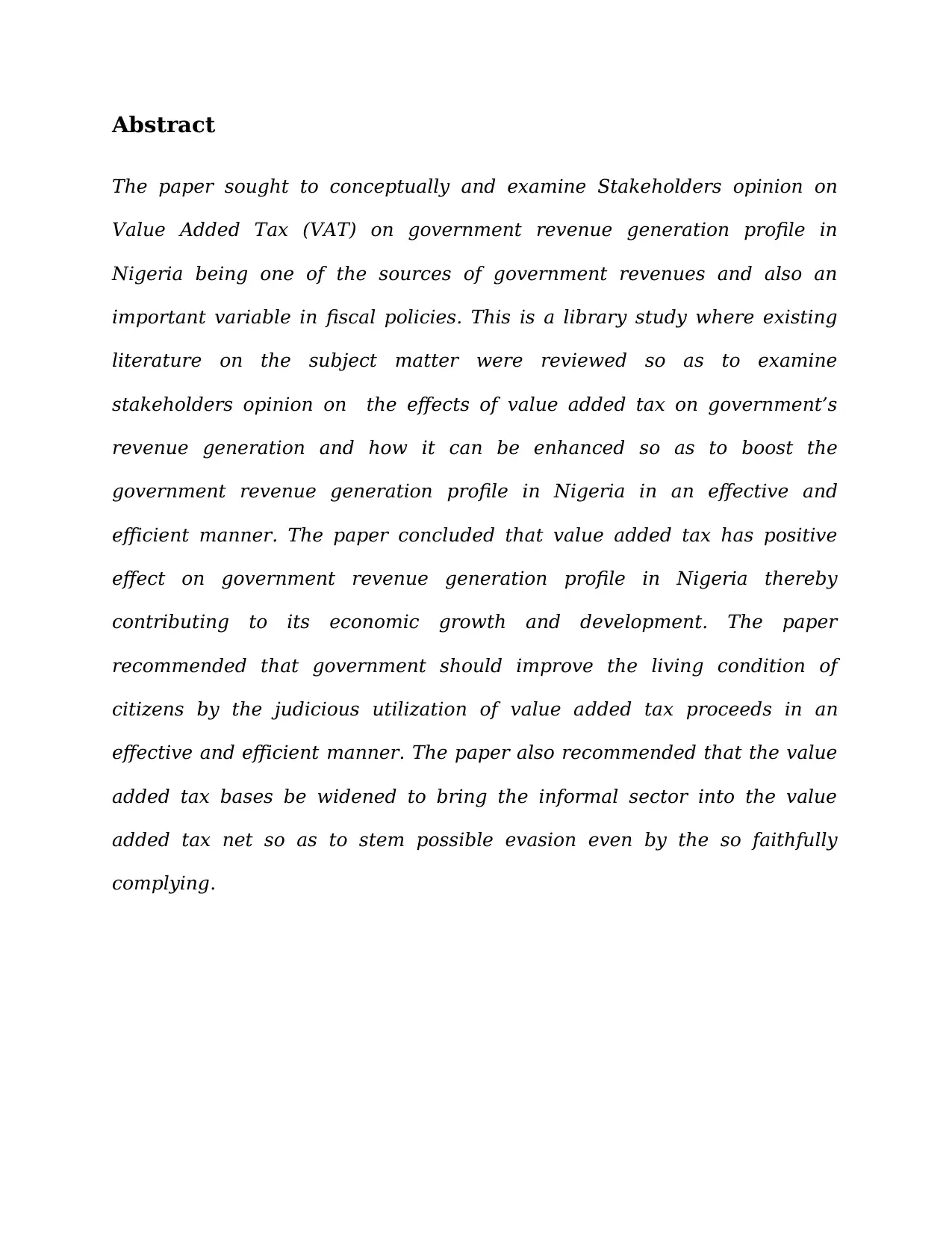
Abstract
The paper sought to conceptually and examine Stakeholders opinion on
Value Added Tax (VAT) on government revenue generation profile in
Nigeria being one of the sources of government revenues and also an
important variable in fiscal policies. This is a library study where existing
literature on the subject matter were reviewed so as to examine
stakeholders opinion on the effects of value added tax on government’s
revenue generation and how it can be enhanced so as to boost the
government revenue generation profile in Nigeria in an effective and
efficient manner. The paper concluded that value added tax has positive
effect on government revenue generation profile in Nigeria thereby
contributing to its economic growth and development. The paper
recommended that government should improve the living condition of
citizens by the judicious utilization of value added tax proceeds in an
effective and efficient manner. The paper also recommended that the value
added tax bases be widened to bring the informal sector into the value
added tax net so as to stem possible evasion even by the so faithfully
complying.
The paper sought to conceptually and examine Stakeholders opinion on
Value Added Tax (VAT) on government revenue generation profile in
Nigeria being one of the sources of government revenues and also an
important variable in fiscal policies. This is a library study where existing
literature on the subject matter were reviewed so as to examine
stakeholders opinion on the effects of value added tax on government’s
revenue generation and how it can be enhanced so as to boost the
government revenue generation profile in Nigeria in an effective and
efficient manner. The paper concluded that value added tax has positive
effect on government revenue generation profile in Nigeria thereby
contributing to its economic growth and development. The paper
recommended that government should improve the living condition of
citizens by the judicious utilization of value added tax proceeds in an
effective and efficient manner. The paper also recommended that the value
added tax bases be widened to bring the informal sector into the value
added tax net so as to stem possible evasion even by the so faithfully
complying.
Paraphrase This Document
Need a fresh take? Get an instant paraphrase of this document with our AI Paraphraser
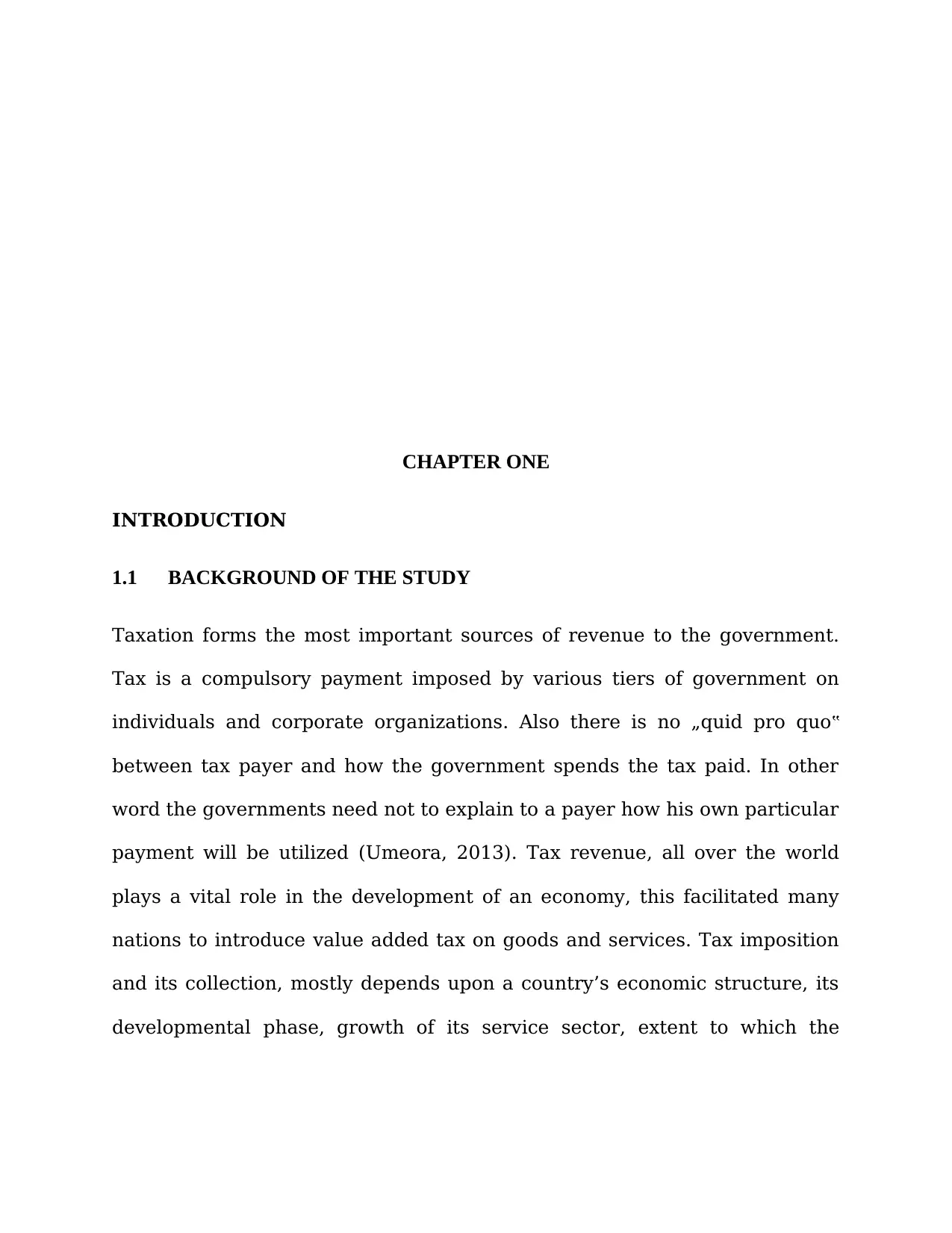
CHAPTER ONE
INTRODUCTION
1.1 BACKGROUND OF THE STUDY
Taxation forms the most important sources of revenue to the government.
Tax is a compulsory payment imposed by various tiers of government on
individuals and corporate organizations. Also there is no „quid pro quo‟
between tax payer and how the government spends the tax paid. In other
word the governments need not to explain to a payer how his own particular
payment will be utilized (Umeora, 2013). Tax revenue, all over the world
plays a vital role in the development of an economy, this facilitated many
nations to introduce value added tax on goods and services. Tax imposition
and its collection, mostly depends upon a country’s economic structure, its
developmental phase, growth of its service sector, extent to which the
INTRODUCTION
1.1 BACKGROUND OF THE STUDY
Taxation forms the most important sources of revenue to the government.
Tax is a compulsory payment imposed by various tiers of government on
individuals and corporate organizations. Also there is no „quid pro quo‟
between tax payer and how the government spends the tax paid. In other
word the governments need not to explain to a payer how his own particular
payment will be utilized (Umeora, 2013). Tax revenue, all over the world
plays a vital role in the development of an economy, this facilitated many
nations to introduce value added tax on goods and services. Tax imposition
and its collection, mostly depends upon a country’s economic structure, its
developmental phase, growth of its service sector, extent to which the
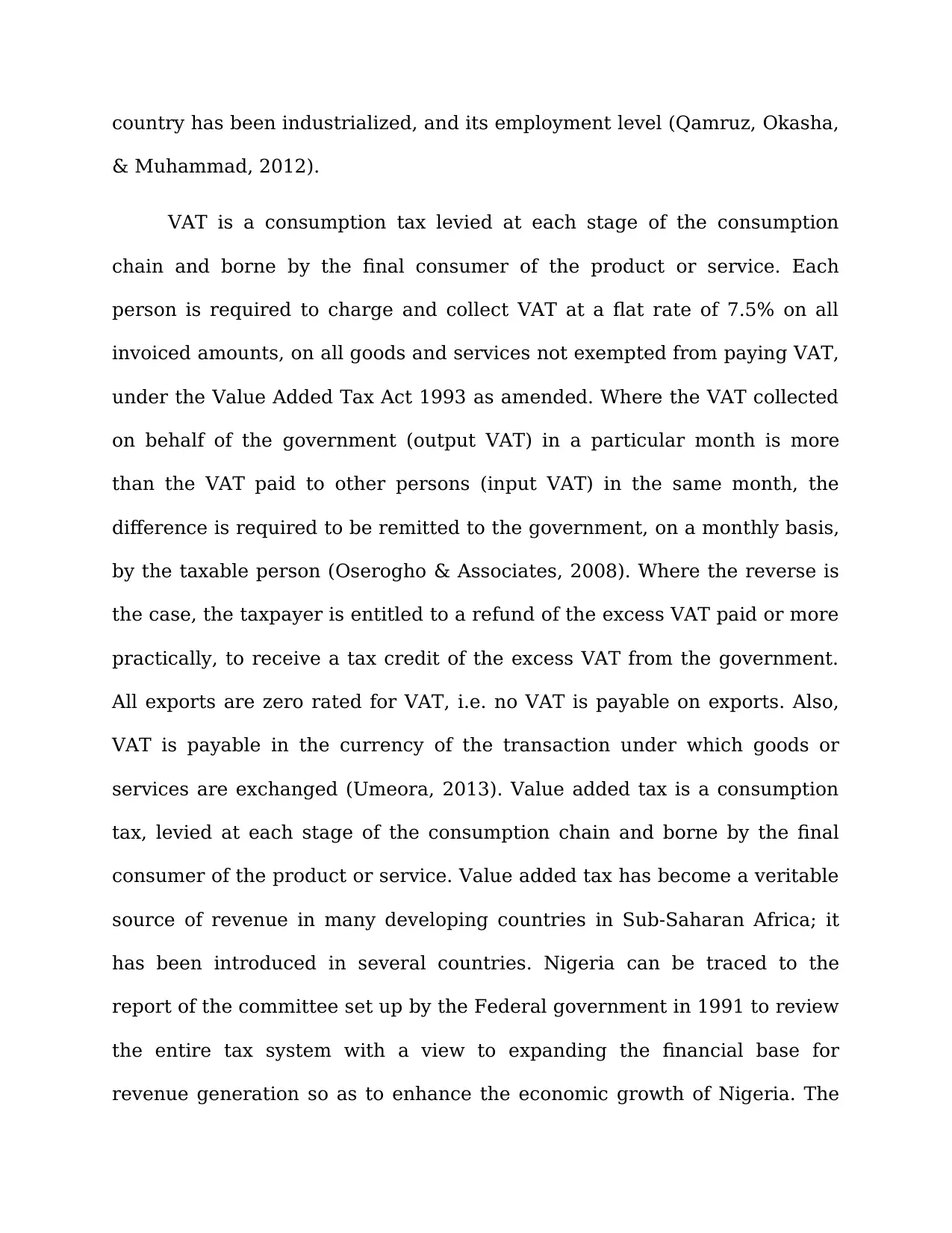
country has been industrialized, and its employment level (Qamruz, Okasha,
& Muhammad, 2012).
VAT is a consumption tax levied at each stage of the consumption
chain and borne by the final consumer of the product or service. Each
person is required to charge and collect VAT at a flat rate of 7.5% on all
invoiced amounts, on all goods and services not exempted from paying VAT,
under the Value Added Tax Act 1993 as amended. Where the VAT collected
on behalf of the government (output VAT) in a particular month is more
than the VAT paid to other persons (input VAT) in the same month, the
difference is required to be remitted to the government, on a monthly basis,
by the taxable person (Oserogho & Associates, 2008). Where the reverse is
the case, the taxpayer is entitled to a refund of the excess VAT paid or more
practically, to receive a tax credit of the excess VAT from the government.
All exports are zero rated for VAT, i.e. no VAT is payable on exports. Also,
VAT is payable in the currency of the transaction under which goods or
services are exchanged (Umeora, 2013). Value added tax is a consumption
tax, levied at each stage of the consumption chain and borne by the final
consumer of the product or service. Value added tax has become a veritable
source of revenue in many developing countries in Sub-Saharan Africa; it
has been introduced in several countries. Nigeria can be traced to the
report of the committee set up by the Federal government in 1991 to review
the entire tax system with a view to expanding the financial base for
revenue generation so as to enhance the economic growth of Nigeria. The
& Muhammad, 2012).
VAT is a consumption tax levied at each stage of the consumption
chain and borne by the final consumer of the product or service. Each
person is required to charge and collect VAT at a flat rate of 7.5% on all
invoiced amounts, on all goods and services not exempted from paying VAT,
under the Value Added Tax Act 1993 as amended. Where the VAT collected
on behalf of the government (output VAT) in a particular month is more
than the VAT paid to other persons (input VAT) in the same month, the
difference is required to be remitted to the government, on a monthly basis,
by the taxable person (Oserogho & Associates, 2008). Where the reverse is
the case, the taxpayer is entitled to a refund of the excess VAT paid or more
practically, to receive a tax credit of the excess VAT from the government.
All exports are zero rated for VAT, i.e. no VAT is payable on exports. Also,
VAT is payable in the currency of the transaction under which goods or
services are exchanged (Umeora, 2013). Value added tax is a consumption
tax, levied at each stage of the consumption chain and borne by the final
consumer of the product or service. Value added tax has become a veritable
source of revenue in many developing countries in Sub-Saharan Africa; it
has been introduced in several countries. Nigeria can be traced to the
report of the committee set up by the Federal government in 1991 to review
the entire tax system with a view to expanding the financial base for
revenue generation so as to enhance the economic growth of Nigeria. The
⊘ This is a preview!⊘
Do you want full access?
Subscribe today to unlock all pages.

Trusted by 1+ million students worldwide
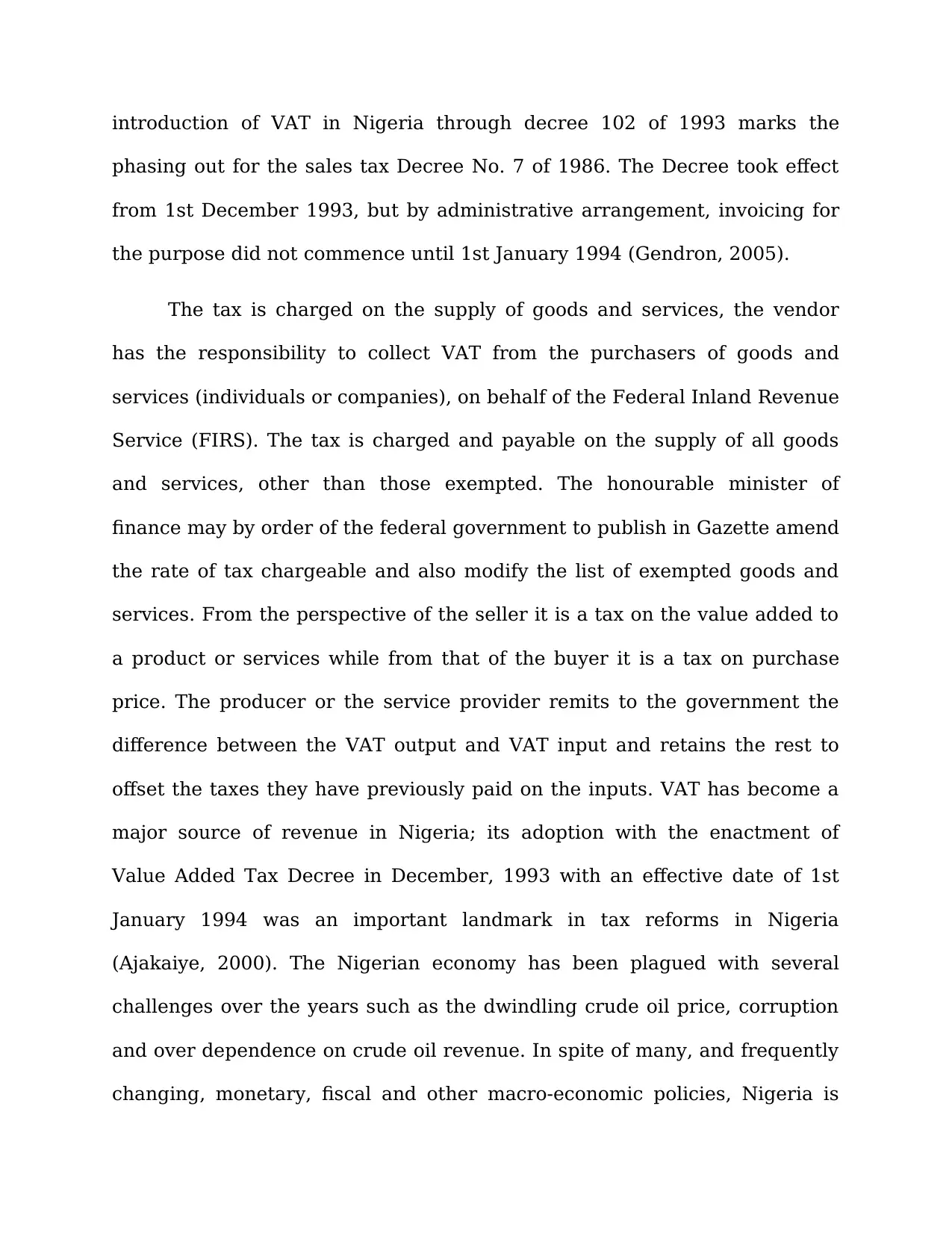
introduction of VAT in Nigeria through decree 102 of 1993 marks the
phasing out for the sales tax Decree No. 7 of 1986. The Decree took effect
from 1st December 1993, but by administrative arrangement, invoicing for
the purpose did not commence until 1st January 1994 (Gendron, 2005).
The tax is charged on the supply of goods and services, the vendor
has the responsibility to collect VAT from the purchasers of goods and
services (individuals or companies), on behalf of the Federal Inland Revenue
Service (FIRS). The tax is charged and payable on the supply of all goods
and services, other than those exempted. The honourable minister of
finance may by order of the federal government to publish in Gazette amend
the rate of tax chargeable and also modify the list of exempted goods and
services. From the perspective of the seller it is a tax on the value added to
a product or services while from that of the buyer it is a tax on purchase
price. The producer or the service provider remits to the government the
difference between the VAT output and VAT input and retains the rest to
offset the taxes they have previously paid on the inputs. VAT has become a
major source of revenue in Nigeria; its adoption with the enactment of
Value Added Tax Decree in December, 1993 with an effective date of 1st
January 1994 was an important landmark in tax reforms in Nigeria
(Ajakaiye, 2000). The Nigerian economy has been plagued with several
challenges over the years such as the dwindling crude oil price, corruption
and over dependence on crude oil revenue. In spite of many, and frequently
changing, monetary, fiscal and other macro-economic policies, Nigeria is
phasing out for the sales tax Decree No. 7 of 1986. The Decree took effect
from 1st December 1993, but by administrative arrangement, invoicing for
the purpose did not commence until 1st January 1994 (Gendron, 2005).
The tax is charged on the supply of goods and services, the vendor
has the responsibility to collect VAT from the purchasers of goods and
services (individuals or companies), on behalf of the Federal Inland Revenue
Service (FIRS). The tax is charged and payable on the supply of all goods
and services, other than those exempted. The honourable minister of
finance may by order of the federal government to publish in Gazette amend
the rate of tax chargeable and also modify the list of exempted goods and
services. From the perspective of the seller it is a tax on the value added to
a product or services while from that of the buyer it is a tax on purchase
price. The producer or the service provider remits to the government the
difference between the VAT output and VAT input and retains the rest to
offset the taxes they have previously paid on the inputs. VAT has become a
major source of revenue in Nigeria; its adoption with the enactment of
Value Added Tax Decree in December, 1993 with an effective date of 1st
January 1994 was an important landmark in tax reforms in Nigeria
(Ajakaiye, 2000). The Nigerian economy has been plagued with several
challenges over the years such as the dwindling crude oil price, corruption
and over dependence on crude oil revenue. In spite of many, and frequently
changing, monetary, fiscal and other macro-economic policies, Nigeria is
Paraphrase This Document
Need a fresh take? Get an instant paraphrase of this document with our AI Paraphraser
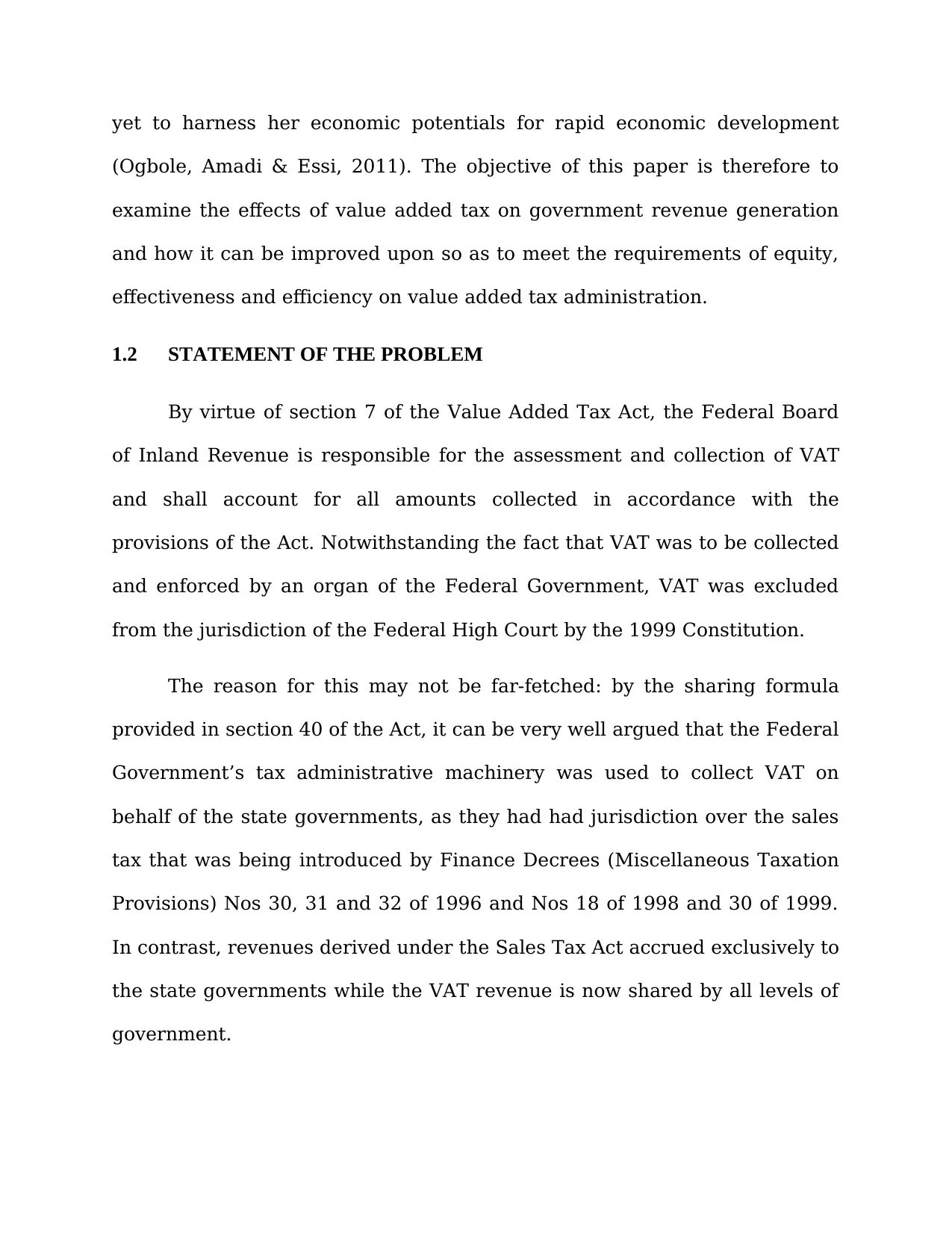
yet to harness her economic potentials for rapid economic development
(Ogbole, Amadi & Essi, 2011). The objective of this paper is therefore to
examine the effects of value added tax on government revenue generation
and how it can be improved upon so as to meet the requirements of equity,
effectiveness and efficiency on value added tax administration.
1.2 STATEMENT OF THE PROBLEM
By virtue of section 7 of the Value Added Tax Act, the Federal Board
of Inland Revenue is responsible for the assessment and collection of VAT
and shall account for all amounts collected in accordance with the
provisions of the Act. Notwithstanding the fact that VAT was to be collected
and enforced by an organ of the Federal Government, VAT was excluded
from the jurisdiction of the Federal High Court by the 1999 Constitution.
The reason for this may not be far-fetched: by the sharing formula
provided in section 40 of the Act, it can be very well argued that the Federal
Government’s tax administrative machinery was used to collect VAT on
behalf of the state governments, as they had had jurisdiction over the sales
tax that was being introduced by Finance Decrees (Miscellaneous Taxation
Provisions) Nos 30, 31 and 32 of 1996 and Nos 18 of 1998 and 30 of 1999.
In contrast, revenues derived under the Sales Tax Act accrued exclusively to
the state governments while the VAT revenue is now shared by all levels of
government.
(Ogbole, Amadi & Essi, 2011). The objective of this paper is therefore to
examine the effects of value added tax on government revenue generation
and how it can be improved upon so as to meet the requirements of equity,
effectiveness and efficiency on value added tax administration.
1.2 STATEMENT OF THE PROBLEM
By virtue of section 7 of the Value Added Tax Act, the Federal Board
of Inland Revenue is responsible for the assessment and collection of VAT
and shall account for all amounts collected in accordance with the
provisions of the Act. Notwithstanding the fact that VAT was to be collected
and enforced by an organ of the Federal Government, VAT was excluded
from the jurisdiction of the Federal High Court by the 1999 Constitution.
The reason for this may not be far-fetched: by the sharing formula
provided in section 40 of the Act, it can be very well argued that the Federal
Government’s tax administrative machinery was used to collect VAT on
behalf of the state governments, as they had had jurisdiction over the sales
tax that was being introduced by Finance Decrees (Miscellaneous Taxation
Provisions) Nos 30, 31 and 32 of 1996 and Nos 18 of 1998 and 30 of 1999.
In contrast, revenues derived under the Sales Tax Act accrued exclusively to
the state governments while the VAT revenue is now shared by all levels of
government.
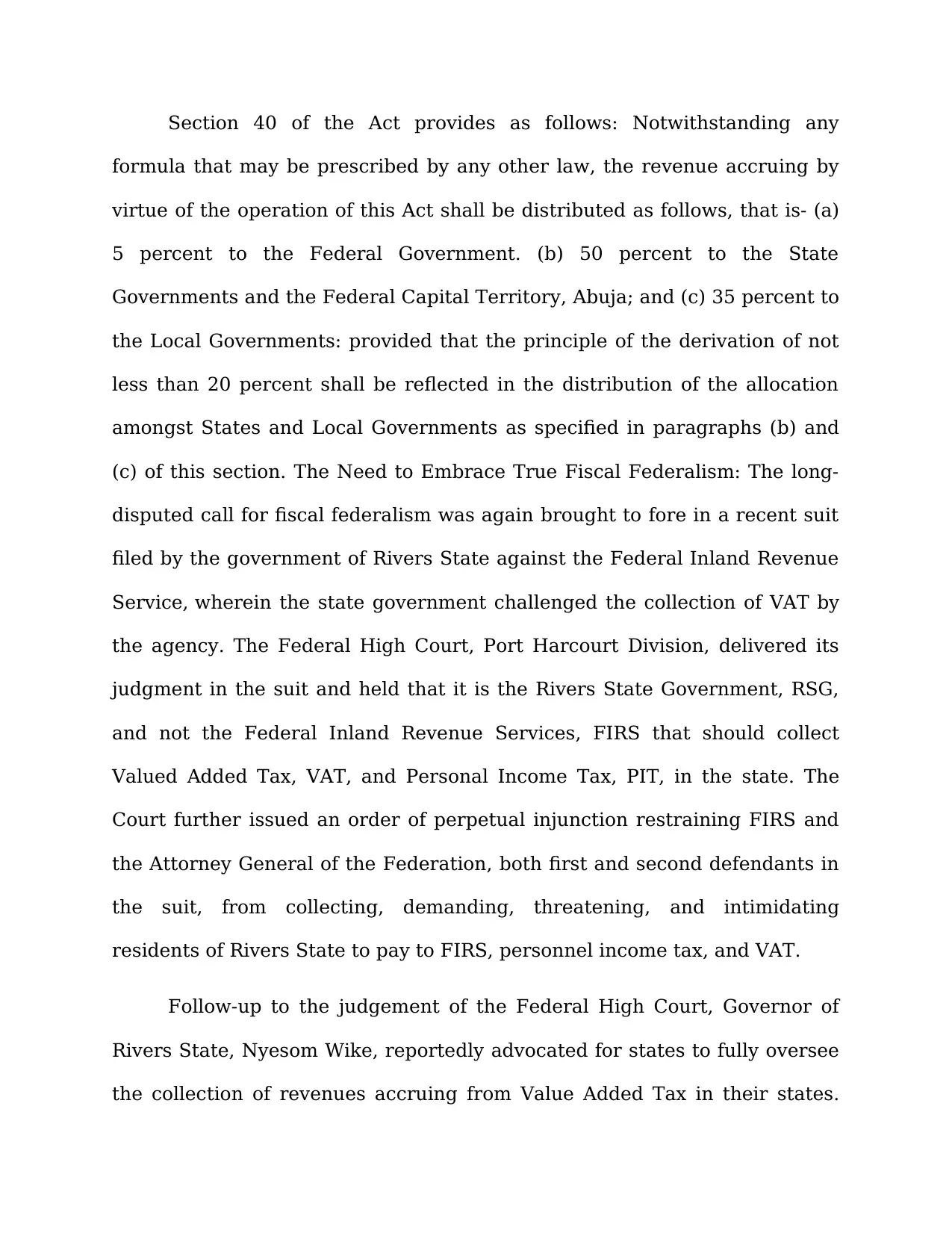
Section 40 of the Act provides as follows: Notwithstanding any
formula that may be prescribed by any other law, the revenue accruing by
virtue of the operation of this Act shall be distributed as follows, that is- (a)
5 percent to the Federal Government. (b) 50 percent to the State
Governments and the Federal Capital Territory, Abuja; and (c) 35 percent to
the Local Governments: provided that the principle of the derivation of not
less than 20 percent shall be reflected in the distribution of the allocation
amongst States and Local Governments as specified in paragraphs (b) and
(c) of this section. The Need to Embrace True Fiscal Federalism: The long-
disputed call for fiscal federalism was again brought to fore in a recent suit
filed by the government of Rivers State against the Federal Inland Revenue
Service, wherein the state government challenged the collection of VAT by
the agency. The Federal High Court, Port Harcourt Division, delivered its
judgment in the suit and held that it is the Rivers State Government, RSG,
and not the Federal Inland Revenue Services, FIRS that should collect
Valued Added Tax, VAT, and Personal Income Tax, PIT, in the state. The
Court further issued an order of perpetual injunction restraining FIRS and
the Attorney General of the Federation, both first and second defendants in
the suit, from collecting, demanding, threatening, and intimidating
residents of Rivers State to pay to FIRS, personnel income tax, and VAT.
Follow-up to the judgement of the Federal High Court, Governor of
Rivers State, Nyesom Wike, reportedly advocated for states to fully oversee
the collection of revenues accruing from Value Added Tax in their states.
formula that may be prescribed by any other law, the revenue accruing by
virtue of the operation of this Act shall be distributed as follows, that is- (a)
5 percent to the Federal Government. (b) 50 percent to the State
Governments and the Federal Capital Territory, Abuja; and (c) 35 percent to
the Local Governments: provided that the principle of the derivation of not
less than 20 percent shall be reflected in the distribution of the allocation
amongst States and Local Governments as specified in paragraphs (b) and
(c) of this section. The Need to Embrace True Fiscal Federalism: The long-
disputed call for fiscal federalism was again brought to fore in a recent suit
filed by the government of Rivers State against the Federal Inland Revenue
Service, wherein the state government challenged the collection of VAT by
the agency. The Federal High Court, Port Harcourt Division, delivered its
judgment in the suit and held that it is the Rivers State Government, RSG,
and not the Federal Inland Revenue Services, FIRS that should collect
Valued Added Tax, VAT, and Personal Income Tax, PIT, in the state. The
Court further issued an order of perpetual injunction restraining FIRS and
the Attorney General of the Federation, both first and second defendants in
the suit, from collecting, demanding, threatening, and intimidating
residents of Rivers State to pay to FIRS, personnel income tax, and VAT.
Follow-up to the judgement of the Federal High Court, Governor of
Rivers State, Nyesom Wike, reportedly advocated for states to fully oversee
the collection of revenues accruing from Value Added Tax in their states.
⊘ This is a preview!⊘
Do you want full access?
Subscribe today to unlock all pages.

Trusted by 1+ million students worldwide
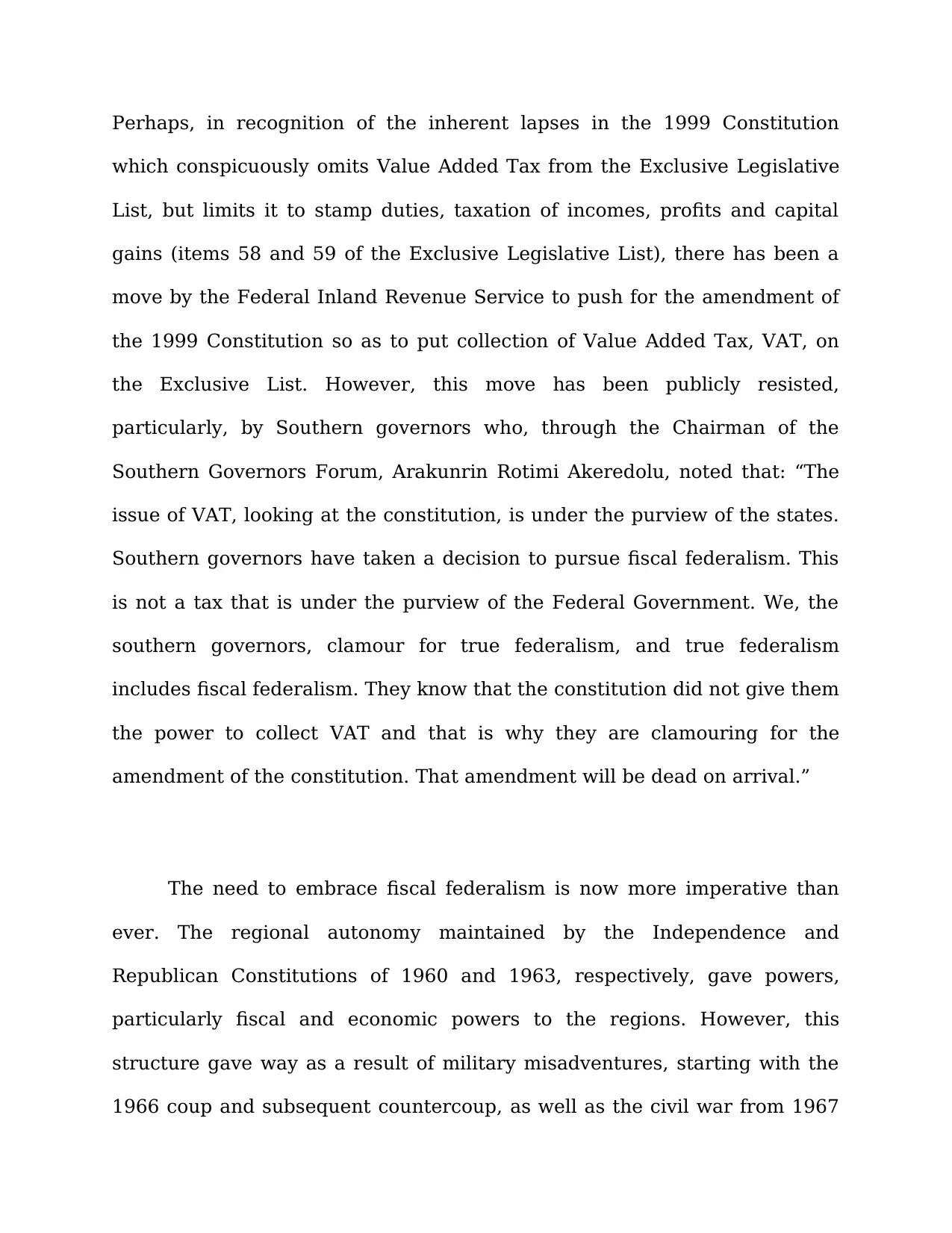
Perhaps, in recognition of the inherent lapses in the 1999 Constitution
which conspicuously omits Value Added Tax from the Exclusive Legislative
List, but limits it to stamp duties, taxation of incomes, profits and capital
gains (items 58 and 59 of the Exclusive Legislative List), there has been a
move by the Federal Inland Revenue Service to push for the amendment of
the 1999 Constitution so as to put collection of Value Added Tax, VAT, on
the Exclusive List. However, this move has been publicly resisted,
particularly, by Southern governors who, through the Chairman of the
Southern Governors Forum, Arakunrin Rotimi Akeredolu, noted that: “The
issue of VAT, looking at the constitution, is under the purview of the states.
Southern governors have taken a decision to pursue fiscal federalism. This
is not a tax that is under the purview of the Federal Government. We, the
southern governors, clamour for true federalism, and true federalism
includes fiscal federalism. They know that the constitution did not give them
the power to collect VAT and that is why they are clamouring for the
amendment of the constitution. That amendment will be dead on arrival.”
The need to embrace fiscal federalism is now more imperative than
ever. The regional autonomy maintained by the Independence and
Republican Constitutions of 1960 and 1963, respectively, gave powers,
particularly fiscal and economic powers to the regions. However, this
structure gave way as a result of military misadventures, starting with the
1966 coup and subsequent countercoup, as well as the civil war from 1967
which conspicuously omits Value Added Tax from the Exclusive Legislative
List, but limits it to stamp duties, taxation of incomes, profits and capital
gains (items 58 and 59 of the Exclusive Legislative List), there has been a
move by the Federal Inland Revenue Service to push for the amendment of
the 1999 Constitution so as to put collection of Value Added Tax, VAT, on
the Exclusive List. However, this move has been publicly resisted,
particularly, by Southern governors who, through the Chairman of the
Southern Governors Forum, Arakunrin Rotimi Akeredolu, noted that: “The
issue of VAT, looking at the constitution, is under the purview of the states.
Southern governors have taken a decision to pursue fiscal federalism. This
is not a tax that is under the purview of the Federal Government. We, the
southern governors, clamour for true federalism, and true federalism
includes fiscal federalism. They know that the constitution did not give them
the power to collect VAT and that is why they are clamouring for the
amendment of the constitution. That amendment will be dead on arrival.”
The need to embrace fiscal federalism is now more imperative than
ever. The regional autonomy maintained by the Independence and
Republican Constitutions of 1960 and 1963, respectively, gave powers,
particularly fiscal and economic powers to the regions. However, this
structure gave way as a result of military misadventures, starting with the
1966 coup and subsequent countercoup, as well as the civil war from 1967
Paraphrase This Document
Need a fresh take? Get an instant paraphrase of this document with our AI Paraphraser
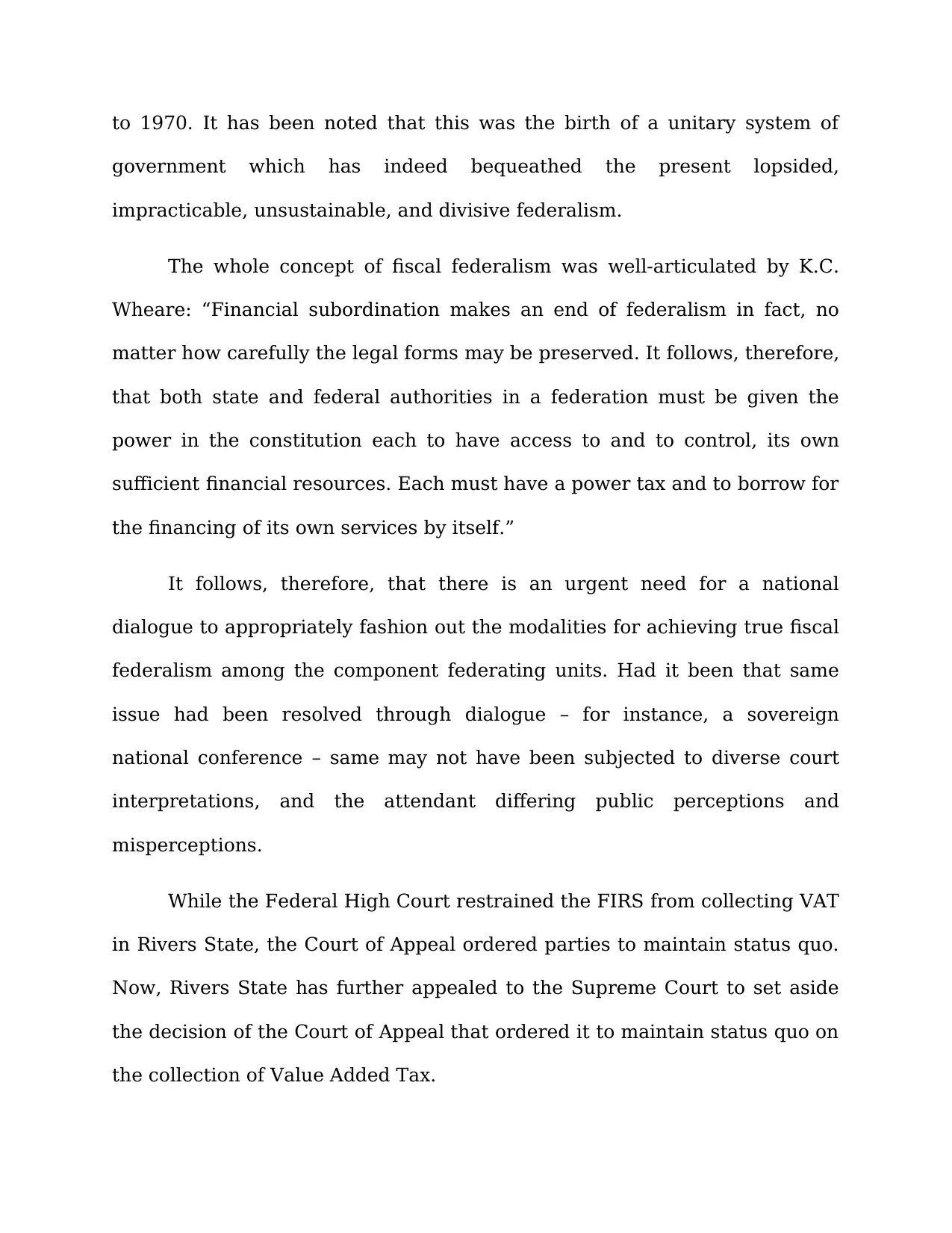
to 1970. It has been noted that this was the birth of a unitary system of
government which has indeed bequeathed the present lopsided,
impracticable, unsustainable, and divisive federalism.
The whole concept of fiscal federalism was well-articulated by K.C.
Wheare: “Financial subordination makes an end of federalism in fact, no
matter how carefully the legal forms may be preserved. It follows, therefore,
that both state and federal authorities in a federation must be given the
power in the constitution each to have access to and to control, its own
sufficient financial resources. Each must have a power tax and to borrow for
the financing of its own services by itself.”
It follows, therefore, that there is an urgent need for a national
dialogue to appropriately fashion out the modalities for achieving true fiscal
federalism among the component federating units. Had it been that same
issue had been resolved through dialogue – for instance, a sovereign
national conference – same may not have been subjected to diverse court
interpretations, and the attendant differing public perceptions and
misperceptions.
While the Federal High Court restrained the FIRS from collecting VAT
in Rivers State, the Court of Appeal ordered parties to maintain status quo.
Now, Rivers State has further appealed to the Supreme Court to set aside
the decision of the Court of Appeal that ordered it to maintain status quo on
the collection of Value Added Tax.
government which has indeed bequeathed the present lopsided,
impracticable, unsustainable, and divisive federalism.
The whole concept of fiscal federalism was well-articulated by K.C.
Wheare: “Financial subordination makes an end of federalism in fact, no
matter how carefully the legal forms may be preserved. It follows, therefore,
that both state and federal authorities in a federation must be given the
power in the constitution each to have access to and to control, its own
sufficient financial resources. Each must have a power tax and to borrow for
the financing of its own services by itself.”
It follows, therefore, that there is an urgent need for a national
dialogue to appropriately fashion out the modalities for achieving true fiscal
federalism among the component federating units. Had it been that same
issue had been resolved through dialogue – for instance, a sovereign
national conference – same may not have been subjected to diverse court
interpretations, and the attendant differing public perceptions and
misperceptions.
While the Federal High Court restrained the FIRS from collecting VAT
in Rivers State, the Court of Appeal ordered parties to maintain status quo.
Now, Rivers State has further appealed to the Supreme Court to set aside
the decision of the Court of Appeal that ordered it to maintain status quo on
the collection of Value Added Tax.
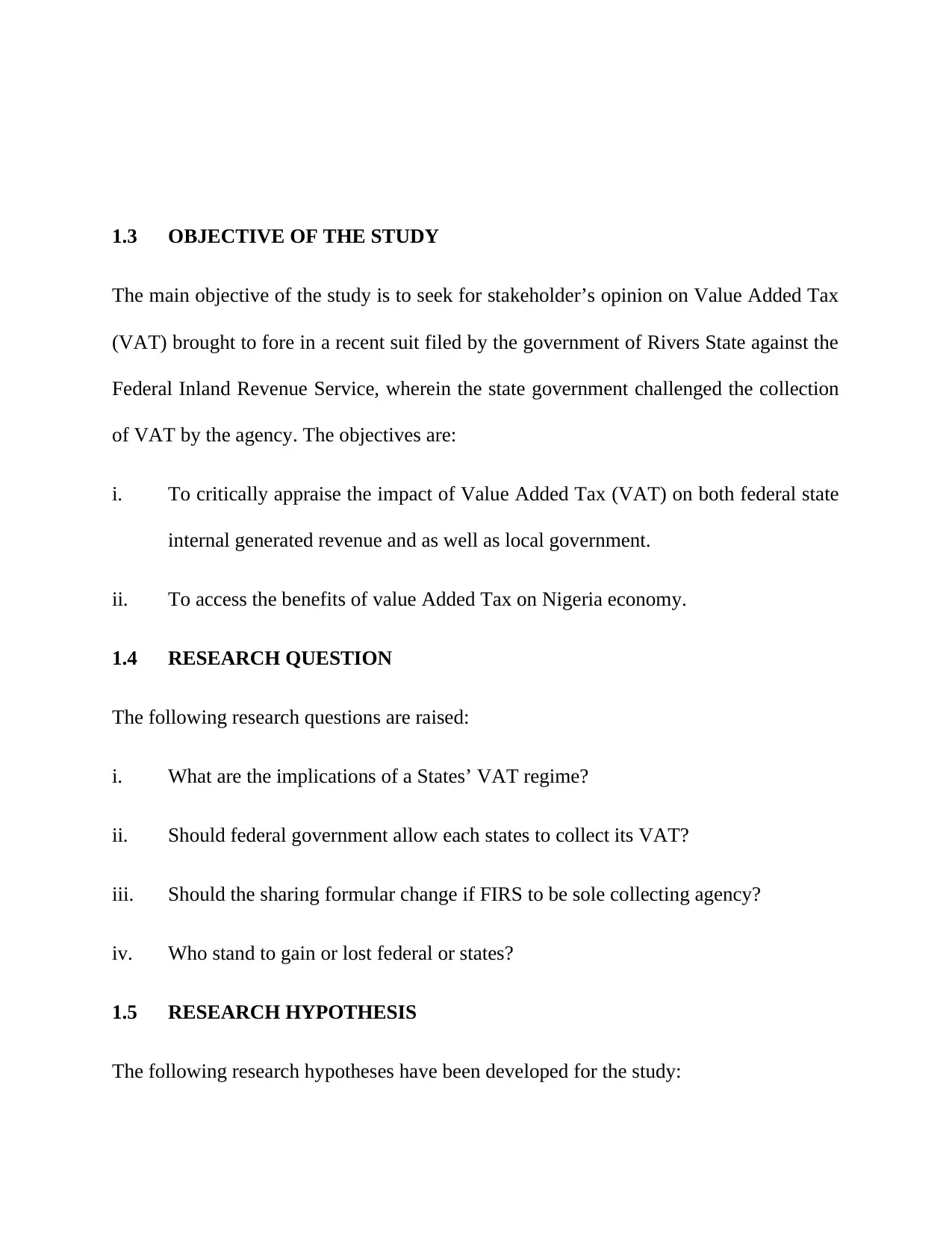
1.3 OBJECTIVE OF THE STUDY
The main objective of the study is to seek for stakeholder’s opinion on Value Added Tax
(VAT) brought to fore in a recent suit filed by the government of Rivers State against the
Federal Inland Revenue Service, wherein the state government challenged the collection
of VAT by the agency. The objectives are:
i. To critically appraise the impact of Value Added Tax (VAT) on both federal state
internal generated revenue and as well as local government.
ii. To access the benefits of value Added Tax on Nigeria economy.
1.4 RESEARCH QUESTION
The following research questions are raised:
i. What are the implications of a States’ VAT regime?
ii. Should federal government allow each states to collect its VAT?
iii. Should the sharing formular change if FIRS to be sole collecting agency?
iv. Who stand to gain or lost federal or states?
1.5 RESEARCH HYPOTHESIS
The following research hypotheses have been developed for the study:
The main objective of the study is to seek for stakeholder’s opinion on Value Added Tax
(VAT) brought to fore in a recent suit filed by the government of Rivers State against the
Federal Inland Revenue Service, wherein the state government challenged the collection
of VAT by the agency. The objectives are:
i. To critically appraise the impact of Value Added Tax (VAT) on both federal state
internal generated revenue and as well as local government.
ii. To access the benefits of value Added Tax on Nigeria economy.
1.4 RESEARCH QUESTION
The following research questions are raised:
i. What are the implications of a States’ VAT regime?
ii. Should federal government allow each states to collect its VAT?
iii. Should the sharing formular change if FIRS to be sole collecting agency?
iv. Who stand to gain or lost federal or states?
1.5 RESEARCH HYPOTHESIS
The following research hypotheses have been developed for the study:
⊘ This is a preview!⊘
Do you want full access?
Subscribe today to unlock all pages.

Trusted by 1+ million students worldwide
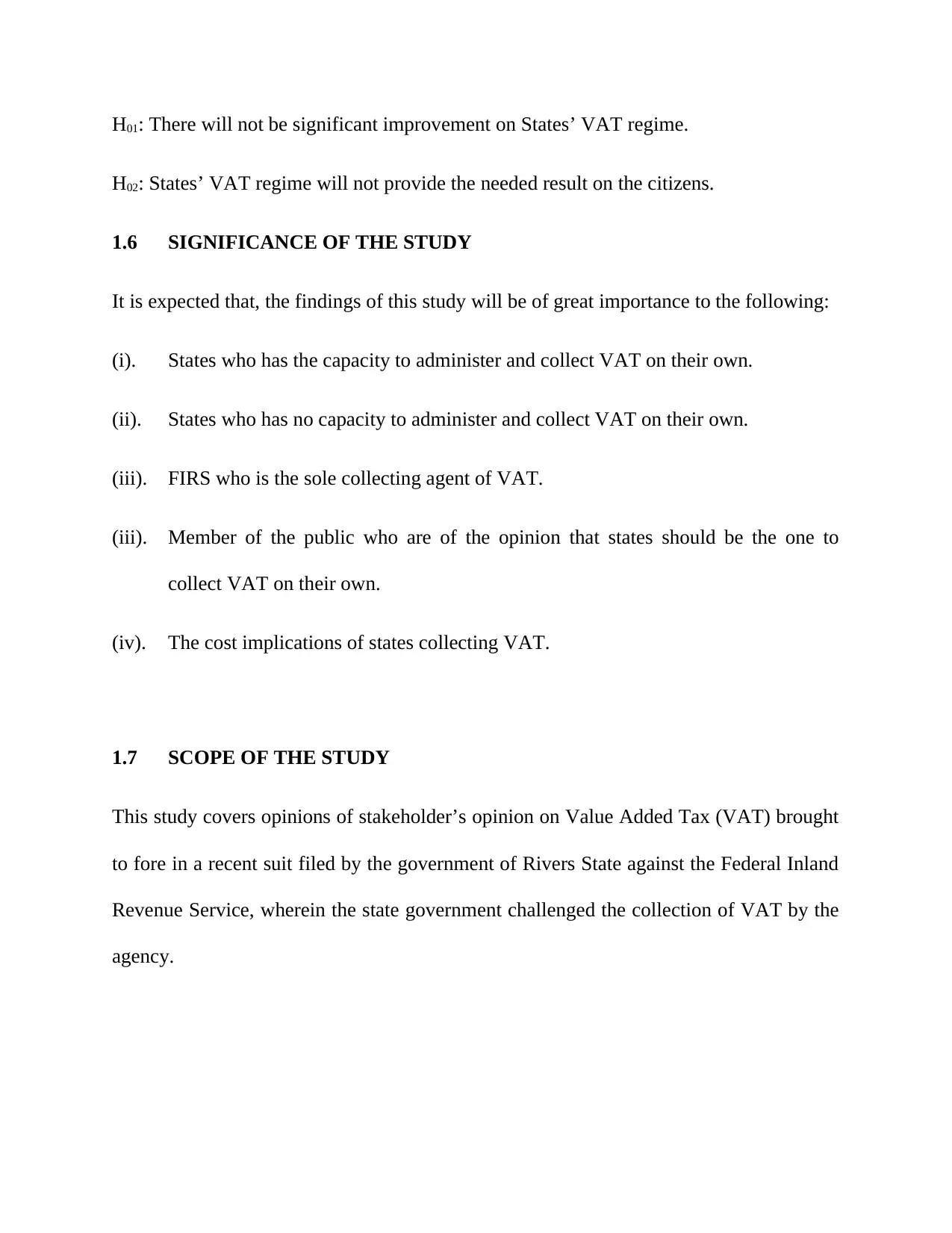
H01: There will not be significant improvement on States’ VAT regime.
H02: States’ VAT regime will not provide the needed result on the citizens.
1.6 SIGNIFICANCE OF THE STUDY
It is expected that, the findings of this study will be of great importance to the following:
(i). States who has the capacity to administer and collect VAT on their own.
(ii). States who has no capacity to administer and collect VAT on their own.
(iii). FIRS who is the sole collecting agent of VAT.
(iii). Member of the public who are of the opinion that states should be the one to
collect VAT on their own.
(iv). The cost implications of states collecting VAT.
1.7 SCOPE OF THE STUDY
This study covers opinions of stakeholder’s opinion on Value Added Tax (VAT) brought
to fore in a recent suit filed by the government of Rivers State against the Federal Inland
Revenue Service, wherein the state government challenged the collection of VAT by the
agency.
H02: States’ VAT regime will not provide the needed result on the citizens.
1.6 SIGNIFICANCE OF THE STUDY
It is expected that, the findings of this study will be of great importance to the following:
(i). States who has the capacity to administer and collect VAT on their own.
(ii). States who has no capacity to administer and collect VAT on their own.
(iii). FIRS who is the sole collecting agent of VAT.
(iii). Member of the public who are of the opinion that states should be the one to
collect VAT on their own.
(iv). The cost implications of states collecting VAT.
1.7 SCOPE OF THE STUDY
This study covers opinions of stakeholder’s opinion on Value Added Tax (VAT) brought
to fore in a recent suit filed by the government of Rivers State against the Federal Inland
Revenue Service, wherein the state government challenged the collection of VAT by the
agency.
Paraphrase This Document
Need a fresh take? Get an instant paraphrase of this document with our AI Paraphraser
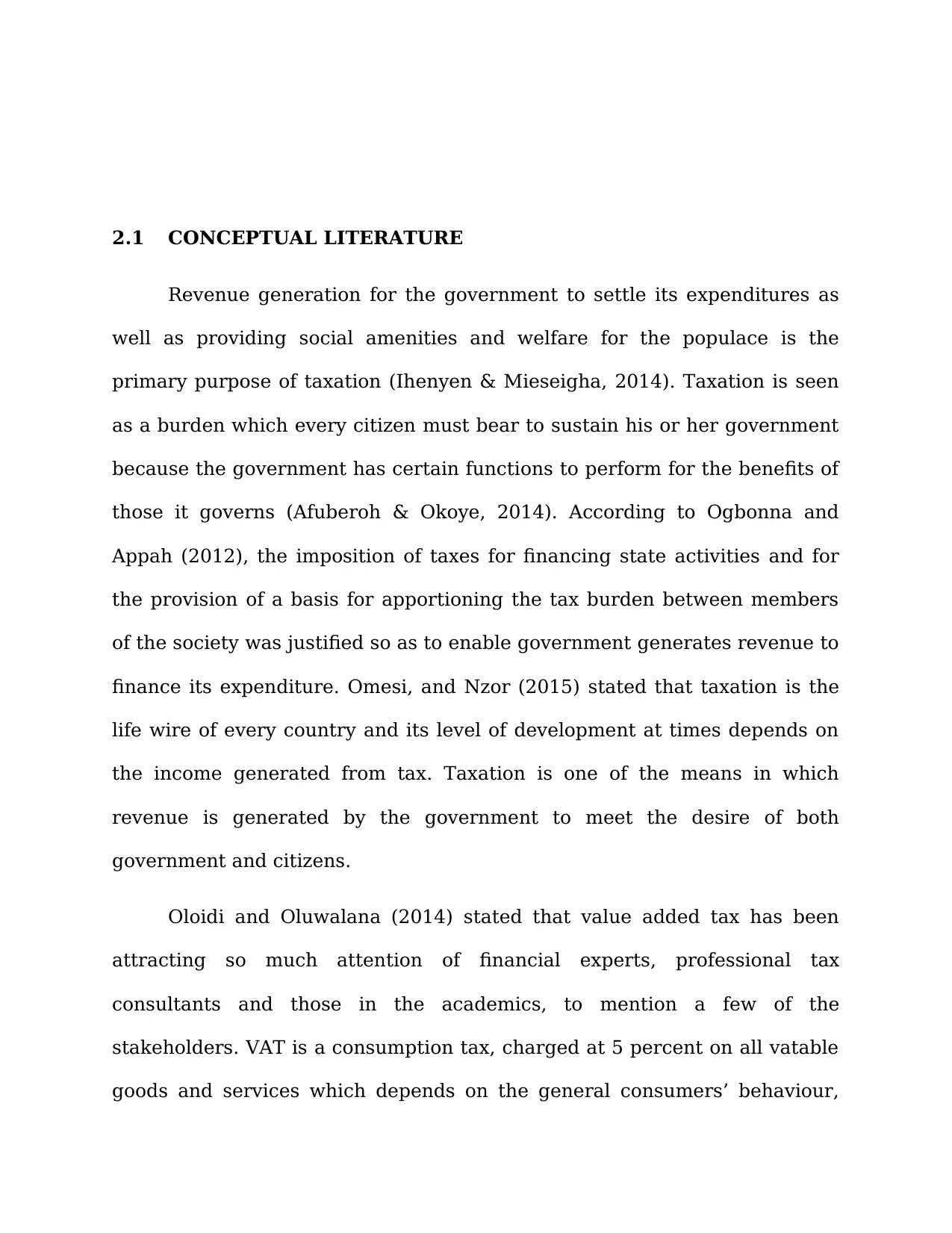
2.1 CONCEPTUAL LITERATURE
Revenue generation for the government to settle its expenditures as
well as providing social amenities and welfare for the populace is the
primary purpose of taxation (Ihenyen & Mieseigha, 2014). Taxation is seen
as a burden which every citizen must bear to sustain his or her government
because the government has certain functions to perform for the benefits of
those it governs (Afuberoh & Okoye, 2014). According to Ogbonna and
Appah (2012), the imposition of taxes for financing state activities and for
the provision of a basis for apportioning the tax burden between members
of the society was justified so as to enable government generates revenue to
finance its expenditure. Omesi, and Nzor (2015) stated that taxation is the
life wire of every country and its level of development at times depends on
the income generated from tax. Taxation is one of the means in which
revenue is generated by the government to meet the desire of both
government and citizens.
Oloidi and Oluwalana (2014) stated that value added tax has been
attracting so much attention of financial experts, professional tax
consultants and those in the academics, to mention a few of the
stakeholders. VAT is a consumption tax, charged at 5 percent on all vatable
goods and services which depends on the general consumers’ behaviour,
Revenue generation for the government to settle its expenditures as
well as providing social amenities and welfare for the populace is the
primary purpose of taxation (Ihenyen & Mieseigha, 2014). Taxation is seen
as a burden which every citizen must bear to sustain his or her government
because the government has certain functions to perform for the benefits of
those it governs (Afuberoh & Okoye, 2014). According to Ogbonna and
Appah (2012), the imposition of taxes for financing state activities and for
the provision of a basis for apportioning the tax burden between members
of the society was justified so as to enable government generates revenue to
finance its expenditure. Omesi, and Nzor (2015) stated that taxation is the
life wire of every country and its level of development at times depends on
the income generated from tax. Taxation is one of the means in which
revenue is generated by the government to meet the desire of both
government and citizens.
Oloidi and Oluwalana (2014) stated that value added tax has been
attracting so much attention of financial experts, professional tax
consultants and those in the academics, to mention a few of the
stakeholders. VAT is a consumption tax, charged at 5 percent on all vatable
goods and services which depends on the general consumers’ behaviour,
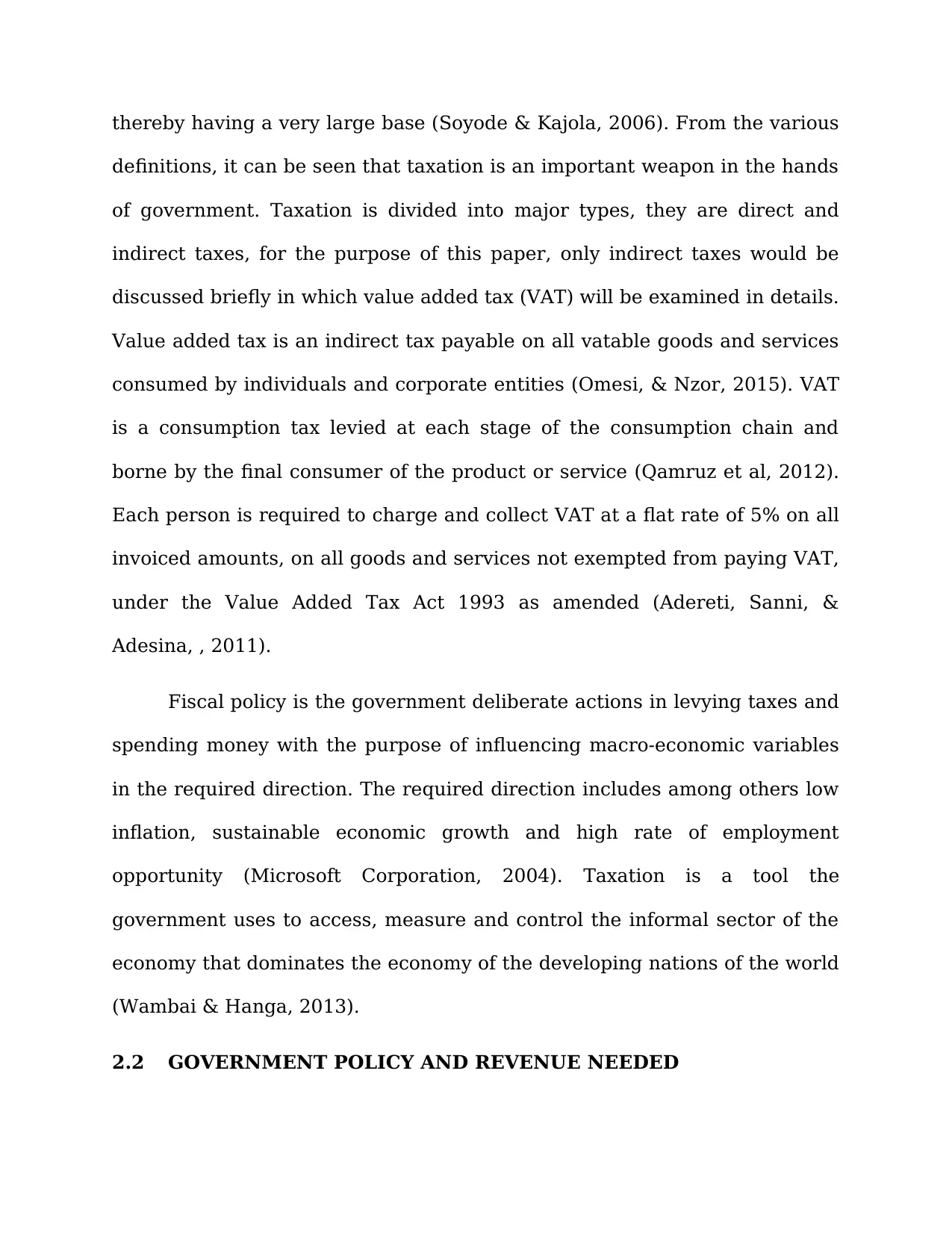
thereby having a very large base (Soyode & Kajola, 2006). From the various
definitions, it can be seen that taxation is an important weapon in the hands
of government. Taxation is divided into major types, they are direct and
indirect taxes, for the purpose of this paper, only indirect taxes would be
discussed briefly in which value added tax (VAT) will be examined in details.
Value added tax is an indirect tax payable on all vatable goods and services
consumed by individuals and corporate entities (Omesi, & Nzor, 2015). VAT
is a consumption tax levied at each stage of the consumption chain and
borne by the final consumer of the product or service (Qamruz et al, 2012).
Each person is required to charge and collect VAT at a flat rate of 5% on all
invoiced amounts, on all goods and services not exempted from paying VAT,
under the Value Added Tax Act 1993 as amended (Adereti, Sanni, &
Adesina, , 2011).
Fiscal policy is the government deliberate actions in levying taxes and
spending money with the purpose of influencing macro-economic variables
in the required direction. The required direction includes among others low
inflation, sustainable economic growth and high rate of employment
opportunity (Microsoft Corporation, 2004). Taxation is a tool the
government uses to access, measure and control the informal sector of the
economy that dominates the economy of the developing nations of the world
(Wambai & Hanga, 2013).
2.2 GOVERNMENT POLICY AND REVENUE NEEDED
definitions, it can be seen that taxation is an important weapon in the hands
of government. Taxation is divided into major types, they are direct and
indirect taxes, for the purpose of this paper, only indirect taxes would be
discussed briefly in which value added tax (VAT) will be examined in details.
Value added tax is an indirect tax payable on all vatable goods and services
consumed by individuals and corporate entities (Omesi, & Nzor, 2015). VAT
is a consumption tax levied at each stage of the consumption chain and
borne by the final consumer of the product or service (Qamruz et al, 2012).
Each person is required to charge and collect VAT at a flat rate of 5% on all
invoiced amounts, on all goods and services not exempted from paying VAT,
under the Value Added Tax Act 1993 as amended (Adereti, Sanni, &
Adesina, , 2011).
Fiscal policy is the government deliberate actions in levying taxes and
spending money with the purpose of influencing macro-economic variables
in the required direction. The required direction includes among others low
inflation, sustainable economic growth and high rate of employment
opportunity (Microsoft Corporation, 2004). Taxation is a tool the
government uses to access, measure and control the informal sector of the
economy that dominates the economy of the developing nations of the world
(Wambai & Hanga, 2013).
2.2 GOVERNMENT POLICY AND REVENUE NEEDED
⊘ This is a preview!⊘
Do you want full access?
Subscribe today to unlock all pages.

Trusted by 1+ million students worldwide
1 out of 21
Related Documents
Your All-in-One AI-Powered Toolkit for Academic Success.
+13062052269
info@desklib.com
Available 24*7 on WhatsApp / Email
![[object Object]](/_next/static/media/star-bottom.7253800d.svg)
Unlock your academic potential
Copyright © 2020–2026 A2Z Services. All Rights Reserved. Developed and managed by ZUCOL.





